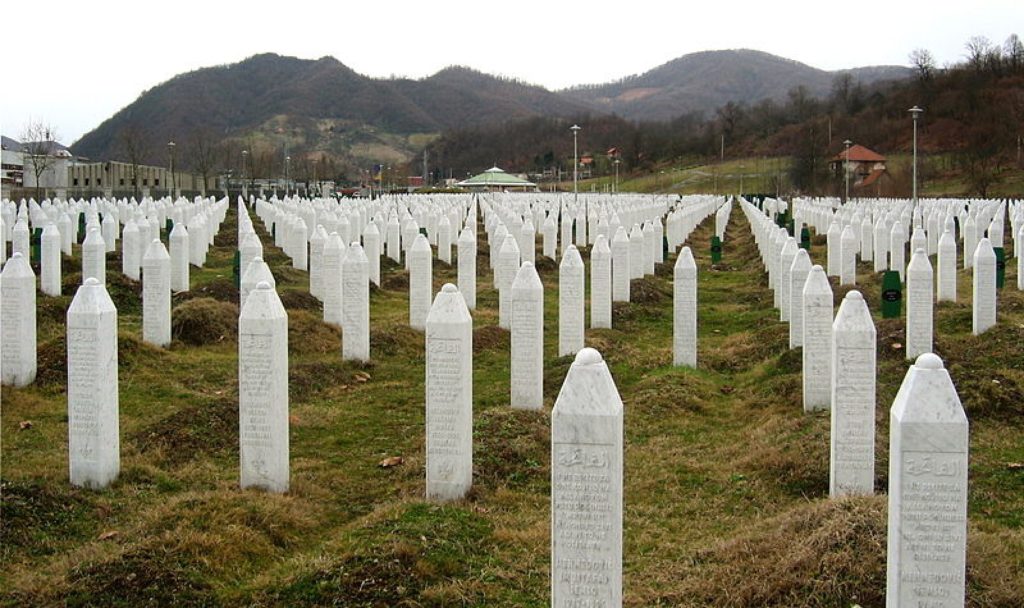When commemorating today the 25th anniversary of the genocide in Srebrenica all countries and actors involved, including the United Nations and the European Union, will reflect on how it was made possible and how to prevent genocides from happening again.
On 11 July 1995, during the civil war in Bosnia-Herzegovina, Bosnian-Serb forces entered Srebrenica, a Muslim town which had been declared a “safe area” by the UN and was protected by a battalion of Dutch UN soldiers.
In the following days, the Muslim men were separated from the rest of the population and murdered by the Bosnian-Serb forces, while the UN soldiers, outnumbered and without the support of UN air strikes, were unable to prevent the massacre.
More than 8,372 Muslim men and boys were killed in a massacre that international courts would later define as genocide, the first one on European soil since the Holocaust in WWII.
Dutch soldiers in a failed UN mission
The Netherlands has investigated the passive role of the Dutch troops in Srebrenica, both in the courts and in historical research. In November 1996, the NIOD Institute for War-, Holocaust- and Genocide Studies received a mandate from the Dutch government to research “the events before, during and after the fall of Srebrenica” and published a report in April 2002.
It concluded that the Dutch battalion, 200 lightly armed soldiers, were sent to Srebrenica in an ill-conceived and virtually impossible peace mission, without adequate training and intelligence resources. The responsibility for not deploying air strikes to save Srebrenica was a decision by UN and its military commanders in the region.
The Srebrenica genocide is commemorated today both internationally and nationally. In the Netherlands, the national broadcast agency has been broadcasting a 7 day “Srebrenica news report” the whole week after the regular news.
A Dutch commentator summarized his take-up of the programme to The Brussels Times: “A black page for the UN or the United Nothing as they were called by the Dutch”.
The Bosnian-Serb army under the command of general Mladic did the killing but the UN bears responsibility for creating the enclave which in the end became a death trap. The Dutch soldiers did not have the mandate nor the weapons to protect the Muslims. “They are now all traumatised bystanders. They felt humiliated and powerless. Afterwards they were accused of cowardness.”
Reconciliation process facilitated by EU
In a joint statement yesterday, European Council President Michel, European Commission President von der Leyen, and High Representative/Vice-President Borrell described the Srebrenica genocide as one of the darkest chapters of modern European history.
“This anniversary is for us a painful reminder. 25 years ago, Europe failed to live up to the promise that never again would there be such tragedy on our continent. It is also a powerful signal of the need to stand up firmly and without exceptions for the universal values – human dignity, in particular – which underpin our Union.”
Day-to-day reconciliation in Bosnia-Herzegovina and Western Balkans has to become reality in politics, in schools, in town halls, in everyday life, the statement says. Leaders everywhere are responsible to ensure that public messages, as well as statues, monuments and the names of public places, streets and squares, champion the quest for reconciliation.
Participants in a virtual conference organised by the Commission on Tuesday remarked that the prevailing mood in the countries involved in the war in Bosnia-Herzegovina in the 90-ies is dominated by nationalistic narratives that prevent them from coming to terms with the past and engaging in a true reconciliation process, a condition for them joining the EU.
“With politicians welcoming war criminals as heroes, there is no true reconciliation process. There is not even justice done when the perpetrators are released after serving short sentences.”
The commemoration of the Srebrenica genocide coincides with the relaunch of the EU-facilitated Belgrade-Pristina dialogue on Sunday (12 July) in Brussels. Will the open wounds of the past be discussed at the dialogue?
A Commission spokesperson told The Brussels Times: “In the normalisation process you try to find mutually agreeable solutions to all open issues, including open wounds. Overcoming the wounds of the past is an important part of the process and applies not only to the Serbia-Kosovo relations but to the whole region. The aim is to reach comprehensive normalisation resulting in a legally binding agreement.”
M. Apelblat
The Brussels Times

